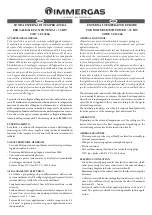
© Fulton Group N.A., Inc. 2022
2-36
INSTALLATION
VSRT-IOM-2022-0728
SECTION 2
Water Supply
The quality of the wat
er used in the boiler will affect the life of the pressure vessel
(PV). It is strongly recommended that a competent water treatment company
is consulted prior to the operation of the boiler. Elements/PV damaged due to
adverse water conditions will not be replaced or repaired under warranty.
Natural feedwater supplies contain hardness, solids and dissolved gases. These
may promote scale, foaming, corrosion, and/or poor steam quality. To prevent
this, feedwater must be analyzed and treated accordingly. The treatment should
provide quality feedwater to the boiler such that corrosion and deposition in the
boiler will be minimized.
Thermal cycling, dissolved oxygen, high or low pH can all be major causes of
corrosion. Untreated hardness is the major cause of scale deposits. Poor quality
feedwater requires increased blowdown and increased chemical treatment costs
to prevent boiler corrosion and scaling.
One way to lower the amount of dissolved gases in the boiler feed water is
to preheat the feedwater. This option injects live steam into the feedwater to
increase the water temperature to 180 F (82 C) or higher which removes oxygen
and carbon dioxide from the water. It is ideal to have the water temperature
above 200°F (93°C) for atmospheric vented tank as long as the feedwater pumps
and other associated components are rated for the temperature.
Be sure that the supplied feedwater pump will operate at elevated feedwater
tank temperatures.
Reverse Osmosis / Deionized (RO/DI) water is water from which all dissolved
solids have been removed. (Consult factory for recommended controls and
equipment for operating on RO/DI water.)
If RO/DI water is used as a water source in a carbon steel boiler, it must be
neutralized to pH >7.5 prior to entering the boiler. Failure to neutralize the RO/DI
will void the PV warranty and cause high general corrosion rates.
The Fulton Warranty does not cover damage or failure that can be attributed to
excessive corrosion, scale or fouling.
!
WARNING
After the appropriate system tests have
been satisfactorily completed, all hot
pipework and vessels must be adequately
insulated with material suited to the
temperature and application to prevent
both heat loss and personnel injury.
















































